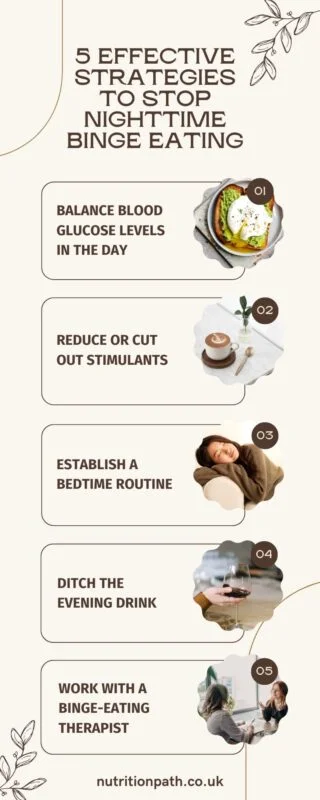Written by Milda Zolubaite MSc Nutritional Therapist with 9 years of experience helping adults overcoming binge eating and eating disorders and improve ADHD symptoms. In the UK and globally online.
Do you habitually turn to food after dinner and feels like you just can’t stop? If reaching for food before bedtime has become a much-needed crutch, you might want to know how to stop nighttime binge eating. You might be stuck in a vicious cycle of the nighttime “reward” after a difficult day. But deep down, each nighttime binge is making you feel more guilty and ashamed.
Nighttime binge eating happens when cravings, stress, habit, exhaustion or irregular eating patterns lead to eating large amounts of food in the evening. Many people search “how to stop binge eating at night” because the cycle feels out of control. The good news? It’s really possible to identify the influences – and change them. This guide covers the most common reasons for nighttime eating and the most effective, nutritional and psychological strategies to stop it.
As a UK and online Nutritional Therapist, who works with disordered eating, I get asked almost daily on how to stop binging at night. So here I’m sharing some of my top tips on how to finally get over late night cravings and feel in control around food, even if you’ve struggled with nighttime binge eating for years (or even decades).
- Synonyms You May See Online
- Signs You May Be Struggling with Nighttime Binge Eating
- Reasons Behind Nighttime Bingeing and Overeating
- Quick Answer: How Do I Stop Nighttime Binge Eating?
- 1. Balance Blood Sugar Levels through the Day
- 2. Reduce or Cut Out Stimulants
- 3. Establish a Bedtime Routine
- 4. Ditch the Evening Drink
- 5. Work with a Binge-Eating Therapist
- FAQ on How to Stop Nighttime Binge Eating
Statistics on Night Eating and Snacking at Night
Let’s find out what some research shows about snacking at night in the wider population:
- According to the Food Insights 2021 survey, more than 1 in 3 Americans under 35 have cravings in the evening and snacks after 11 pm.
- A study on the health impacts of nighttime eating found that while smaller snacks do not affect weight management, nighttime eating of bigger meals negatively affects weight loss efforts. Similarly, another recent study showed that nighttime eating increases waketime hunger and increases the risk of obesity long-term.
- Similarly, Harvard health researchers reported that while the occasional late dinner may not affect weight gain, eating late over time leads to increased weight.
- It is estimated that 1.5% of the population has the Night Eating Syndrome (NES) or Night Eating Disorder (more on that later).
Checklist: Common Patterns in Nighttime Eating
- Eating more than 25% of daily calories after dinner
- Feeling “out of control” around evening snacks
- Strong cravings between 8pm–1am
- Mindless eating while watching TV
- Eating to unwind, numb emotions, or avoid tasks.
Is it a Night Eating Disorder?
How do I know if my nighttime eating is emotional or physical hunger?
Physical hunger builds gradually and is satisfied by balanced foods. Emotional hunger appears suddenly, demands specific foods (usually carbs or sugar), and doesn’t come with physical hunger cues.
Can nighttime eating happen without it being binge eating?
Yes. If you’re eating small snacks due to habit, mild hunger, or routine, it may not qualify as binge eating. Binge eating involves loss of control and intense distress afterward.
Night Eating Disorder or Night Eating Syndrome (NES), is an eating disorder that is characterised by late-night eating habits that aren’t linked to hunger.
Similarly to Binge Eating Disorder (BED), NES is more than just occasional late-night snacking. Usually a person with NES consumes a substantial portion of their daily caloric intake after dinner and often wakes up at night to eat.
These binge eating episodes of eating at night often lead to guilt, shame, and sleep disturbances. There’s no doubt that it can also affect physical and mental health long-term.
Do you experience full-blown binge eating episodes when you’re not at all hungry? Are they followed by guilt and regret?
If so, it would be a good idea to speak with a healthcare professional or a binge-eating therapist. You would figure out if you are indeed experiencing Night Eating Disorder. You would also find out how to stop nighttime binge-eating and take back the control of your health and sleep.

Why Is It Harder to Control Eating at Night?
When you get to the evening, your brain has already made hundreds, if not thousands of micro decisions: what to eat, what to say, what to prioritise, what to ignore, what to finish, what to postpone. This constant stream of micro-choices drains your mental energy, leading to decision fatigue.
Many clients in my Nutritional therapy clinic say they have weak willpower and are not able to “resist” temptation. It’s important to know that willpower is not a static value and by the end of the day it may be depleted, coupled with decision fatigue.
When decision fatigue sets in, your brain becomes less capable of:
- regulating impulses
- thinking long-term
- sticking to intentions (“I won’t snack tonight”)
- choosing nourishing foods
- calming emotions effectively
You are no longer overeating because you’re “weak” or “lack discipline”—you are eating because your brain is exhausted, overloaded, and seeking the quickest form of comfort and dopamine.
This is especially true if you are stressed, sleep-deprived, neurodivergent (such as ADHD), or spending your evenings multitasking, working, or scrolling.
When mental energy is low, the brain chooses predictable, fast-reward foods—usually sugary, salty or crunchy—because they require zero effort and offer quick stimulation.
Understanding Late-Night Cravings and Snacking at Night
Signs You May Be Struggling with Nighttime Binge Eating
Many people assume nighttime eating is about willpower alone, but there are very real physiological and emotional triggers behind it. Here are some of the common signs that you may struggle with nighttime binge eating:
- Eating large amounts of food after dinner
- Feeling “pulled” to the kitchen even when not hungry
- Eating mindlessly while tired, stressed or overstimulated
- Strong evening cravings but low hunger during the day
- Trouble stopping once you start eating
- Guilt or shame after evening eating
- Sleep disruption due to eating
Reasons Behind Nighttime Bingeing and Overeating
The first step to overcoming cravings at night is to start understanding where they may come from. Here are a few factors that could influence nighttime cravings:
- Hormonal Imbalances: Hormones like leptin and ghrelin regulate signals for hunger and fullness. Imbalances in these hormones could mean cravings are through the roof. Also, imbalances in blood sugar regulation earlier in the day can lead to snacking at night.
- Stress and Emotional Eating: No doubt that high (or chronic) stress can influence increased cravings and serve as a coping mechanism. Does it feel like you can only let go of all your worries at night? Or perhaps there is more overthinking or worrying that happens at night.
- Lack of Proper Nutrition: If your body doesn’t receive the nourishment it needs through the day, you may experience intense snacking at night. Likely, your body is trying to compensate for the lack of nutrients and is asking for it NOW. This could be due to lack in quality or quantity of food or erratic and irregular meals.
- Disrupted Sleep Patterns: Sleep deprivation, lack of quality sleep or irregular sleep patterns can imbalance your hunger and fullness hormones. This can lead to increased hunger and late-night snacking. This may be especially noticeable in late-night and shift workers.
Pay attention to your food and lifestyle habits, as they might give away the reason for nighttime binges. Once you figure out the WHY then it’s important to address the HOW.
Why are my cravings strongest late at night?
Your willpower, dopamine levels, and blood sugar regulation naturally dip in the evening, making cravings feel stronger even when you are not physically hungry.
Does poor sleep increase nighttime cravings?
Yes. Poor sleep disrupts hunger hormones (ghrelin ↑, leptin ↓), which increases appetite and cravings — especially for sugary, high-carb foods.

How to Stop Nighttime Binge Eating: 5 Effective Strategies
Ditching nighttime binging may take time and is an individual process for everyone. Here are some of the most effective strategies that helped my clients in the UK and worldwide through online sessions stop snacking at night for good.
1. Balance Blood Sugar Levels through the Day
It’s essential to focus on blood sugar level balance in the day to avoid nighttime binge eating episodes. Stable blood sugar levels can prevent the spikes and crashes that can intensify the cravings. This including late-night cravings.
Focus on eating balanced meals through the day to stop the tsunamis and crashes of glucose. Include a mix of complete proteins, beneficial fats, and complex carbohydrates in your meals. As these macronutrients are digested at different rates, your body will have a steady input of energy available.
Focus on having at least 1/4-1/2 of your plate vegetables for fibre, vitamin and minerals. Then, roughly a palm-size portion of protein, and another palm-size portion of complex carbs. Add around a 1-2 thumb-worth amount of beneficial fats to your meals.
Avoiding high-sugar foods in isolation or excess can be beneficial, as you might avoid a rapid spike and crash in blood sugar. Additionally, this will prevent the surge of hunger and cravings later in the day.
For snacks, aim for foods higher in protein or beneficial fats. Such include nuts or seeds with a piece of fruit, hummus with vegetable sticks or hard-boiled eggs. These can help keep you full for longer.
Aim to have regular meals and manage your blood glucose levels effectively during the day. That way you set the stage for a binge-free night and restful sleep.
This is also one of the most effective steps in managing sugar cravings if you have (or suspect you have) ADHD.
Should I avoid carbs at dinner to stop nighttime eating?
No. Too few carbs at dinner can lead to hunger and cravings later. It’s better to include a moderate amount of complex carbs.
2. Reduce or Cut Out Stimulants
Stimulants can easily disrupt your sleep patterns and lead to late-night cravings. Caffeine (mainly in coffee, black, green and white tea) stimulates your nervous system and keeps you awake if you’d rather sleep. This can push back your normal sleep time. Plus, the extra awake time can lead to increased hunger.
Additionally, caffeine can cause an energy crash after it wears off. And that can lead to feelings of tiredness and triggering the body’s desire for quick energy. Thus often increases late-night cravings for sugary or processed foods. While 1/2 the caffeine may take 4-6h to clear out of the body, in some cases it takes up to 12h. And this can contribute to increased anxiety, digestive issues, in addition to cravings.
Start by reducing caffeine to a maximum of 2 cups a day. Have your last one around lunchtime, or completely eliminate caffeinated drinks. This can help maintain balanced energy levels and reduce late-night snacks.
What drinks are best in the evening to reduce binge urges?
Herbal teas like chamomile, lemon balm, or peppermint help relax your nervous system and reduce emotional eating triggers.
3. Establish a Bedtime Routine
Establishing a consistent bedtime routine can be an amazing and effective strategy to stop nighttime binge eating. When the body’s circadian rhythm (sleep-wake cycle), is in balance, sleep quality and overall wellbeing is improved. This also helps manage nighttime cravings and reducing snacking at night becomes effortless.
A practical way to create a bedtime routine is to engage in calming activities about one to two hours before sleep (depending on your levels of stress and activity). Make time for a hot bath with Epsom salts, read a relaxing or simply lie down and breathe. Also, practice relaxation exercises, mindfulness or yoga.
Remember to switch off electronic devices, which increase your exposure to blue light. Blue light suppresses the release of melatonin levels, a hormone responsible for sleep. Unplug at least one hour before bed to reset your internal clock.
That way, you are more likely to get quality sleep and less likely to get caught out with late-night cravings. A regular sleep routine can be super helpful to avoid cravings on autopilot. Also, learning how to stop nighttime cravings can feel more natural.
Does blue light really make nighttime cravings worse?
Yes. Blue light suppresses melatonin, keeps your brain alert, and increases the likelihood of mindless snacking.
What is the best time to stop eating at night?
There’s no universal cutoff, but finishing dinner 2–4 hours before bed helps digestion and reduces impulsive late-night snacking.
4. Ditch the Evening Drink
Do you have a glass of wine or a couple of beers to relax before bed? Having alcohol in the evening can be problematic as alcohol can stimulate your appetite. Increased appetite can lead to overeating, and disrupted your sleep patterns, making you more likely to turn to snacking and grazing.
Alcohol can also disrupt sleep and prevent you from getting into the stages of deep restorative sleep. The lack of sleep in turn can affect your appetite and the cycle continues.
Try replacing alcohol in the evening with a calming herbal tea, like chamomile or peppermint. It can help you relax and de-stress and prepare your body for deep sleep. Keep yourself busy with self-care and soothing activities that bring you joy while you’re figuring out how to stop the evening drink.
Why does alcohol make me want to snack?
Alcohol lowers blood sugar and reduces inhibition, leading to more impulsive decisions around food.

5. Work with a Binge-Eating Therapist
If your nighttime food habits are making you feel hopeless and miserable, then it’s a really great idea to get support from a professional. While your doctor may be able to direct you to Binge Eating Specialists, often help is classed by diagnosed eating disorders and waiting lists (especially since the Covid pandemic) often have months or years of waiting.
In that case, it can be useful to seek private Binge Eating Therapists. Seek people, who specialise in exclusively working with disordered eating patterns. Such include nighttime binge eating and as well as a diagnosed Night Eating Disorder.
Working with a Binge Eating counsellor or psychotherapist can be crucial in learning how to stop nighttime binge eating. However, working with psychological support as well as nutritional support, might make the progress faster, due to psychological and nutritional bases being covered. Nutritional professionals include nutritional therapists, nutritionists or dieticians.
A nutritional professional can support you in finding a balanced diet, establishing eating habits that are personalised to you and help equip you with practical tools and techniques to stop binge eating at night.
👉 Ready to finally stop nighttime binge eating?
Final Thoughts on How to Stop Nighttime Binge Eating
It doesn’t matter if nighttime binge eating has been with your for months or decades. What’s important to know that recovery is possible and support is definitely available! With the right support, you can learn to ditch binge eating at night and create a relationship with food that feels good to you.
You may find that many people indeed eat and snack at night and it’s not a big deal. Yet, deep down you may recognise that you’re unable to stop the nighttime binge eating episodes. You feel completely out of control around your food intake in the night. Perhaps it’s also followed by intense feelings of guilt and shame every time.
But remember that the journey to recovery takes time. Especially, if the habits have been with you for years (or decades). And while the first step to seeking help usually feels daunting, it’s also the hardest!
You are in control of your recovery journey – take it one step at a time. And most importantly, remember to celebrate each little victory, because that’s how progress happens. Here you can also find further advice on how to stop sugar cravings and binges to support you on your journey. Good luck! 💪🏻👍🏼
Checklist: Quick Wins to Stop Nighttime Binge Eating Today
- Eat 3 balanced meals + 1–2 snacks
- Stop caffeine by early afternoon
- Add an evening wind-down routine
- Keep easy protein-rich snacks available
- Avoid restrictive rules during the day
- Create a “post-dinner plan”
- Track patterns briefly for 3–5 days.
FAQ on How to Stop Nighttime Binge Eating
-
Why do I binge eat at night?
Evening binge eating can be triggered by stress, emotional overwhelm, irregular daytime eating, low protein intake, fatigue, or habit-based routines. Blood sugar crashes and low dopamine also play a role.
-
How can I stop nighttime binge eating quickly?
Start by balancing daytime blood sugar, reducing stimulants, creating a nighttime routine, avoiding alcohol, and reducing stress before bed. These steps reduce cravings and stabilise hunger hormones.
-
What foods help reduce nighttime cravings?
Balanced meals with protein, fibre, healthy fats, and complex carbs support blood sugar levels and prevent late-night hunger spikes. Protein-rich dinners are especially effective.
-
How do I stop emotional eating in the evening?
Use a soothing routine (breathing, warm bath, journaling), reduce evening stress triggers, and create a “wind-down hour” to support emotional regulation. Nutritional therapy and psychotherapy can also help address deeper emotional triggers.
-
When should I get support for nighttime binge eating?
If nighttime eating feels out of control, causes shame, disrupts sleep, or affects your health, it’s a good time to seek help from a binge-eating therapist or a nutritional professional.
-
Is nighttime binge eating a sign of an eating disorder?
Nighttime binge eating can be part of Binge Eating Disorder (BED) or Night Eating Syndrome (NES), but not always. A trained binge-eating therapist or nutritional therapist can help you identify the root cause and the right support approach.
References (further reading)
- Kinsey, A. W., & Ormsbee, M. J. (2015). The health impact of nighttime eating: old and new perspectives. Nutrients, 7(4), 2648–2662. https://doi.org/10.3390/nu7042648
2. International Food Information Council. (2021, May 19). 2021 Food & Health Survey. https://ific.org/research/2021-food-health-survey/
3. Vujović, N., Piron, M. J., Qian, J., Chellappa, S. L., Nedeltcheva, A., Barr, D., Heng, S. W., Kerlin, K., Srivastav, S., Wang, W., Shoji, B., Garaulet, M., Brady, M. J., & Scheer, F. A. J. L. (2022). Late isocaloric eating increases hunger, decreases energy expenditure, and modifies metabolic pathways in adults with overweight and obesity. Cell Metabolism, 34(10), 1486–1498.e7. https://doi.org/10.1016/j.cmet.2022.09.007
4. Godman, H. (2023, January 1). Harvard study: Curb late-night eating to stave off weight gain. Harvard Health Publishing. https://www.health.harvard.edu/staying-healthy/harvard-study-curb-late-night-eating-to-stave-off-weight-gain
5. Pinto, T. F., Silva, F. G., Bruin, V. M., & Bruin, P. F. (2016). Night eating syndrome: How to treat it?. Revista da Associacao Medica Brasileira (1992), 62(7), 701–707. https://doi.org/10.1590/1806-9282.62.07.701






One thought on “Nighttime Binge Eating: Why It Happens and How to Stop It for Good”